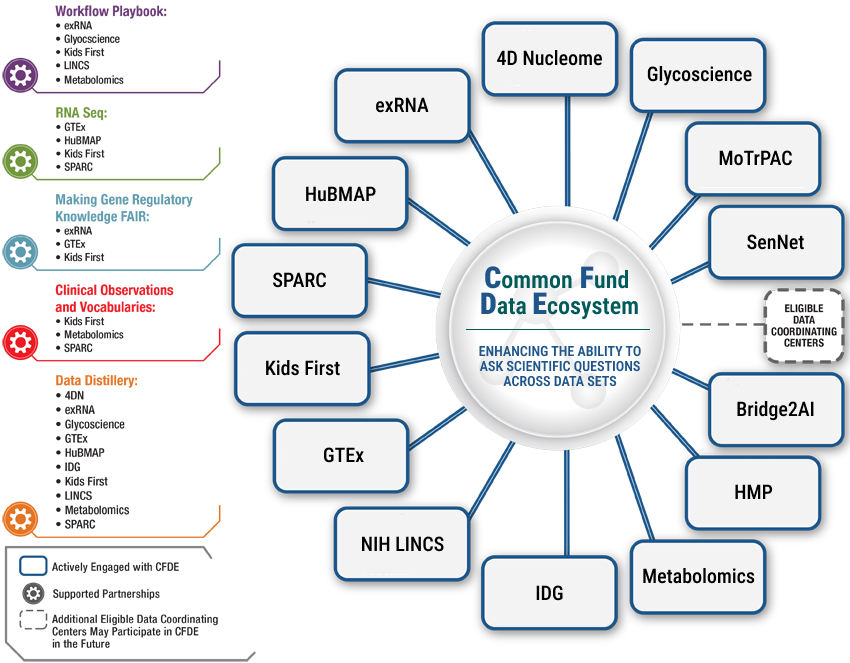

Kids First
The goal of the Gabriella Miller Kids First Pediatric Research Program (Kids First) is to help researchers uncover new insights into the biology of childhood cancer and structural birth defects, including the discovery of shared genetic pathways between these disorders. Visit the Kids First program page and the Kids First Data Resource Portal to learn more.
CFDE Engagement Award: OD030162
SPARC
The Stimulating Peripheral Activity to Relieve Conditions (SPARC) program seeks to accelerate development of therapeutic devices that modulate electrical activity in nerves to improve organ function. Visit the SPARC program page and the SPARC Portal to learn more.
CFDE Engagement Award: OD030164
HuBMAP
The goal of the Human BioMolecular Atlas Program (HuBMAP) is to develop an open and global platform to map healthy cells in the human body. Visit the HuBMAP program page and the HuBMAP Consortium webpage to learn more.
CFDE Engagement Award: OD030545
exRNA
The Extracellular RNA Communication (ExRNA) program is working to understand extracellular RNA biology and accelerate development of potential therapeutics and diagnostics. Visit the ExRNA program page and the ExRNA Research Portal to learn more.
CFDE Engagement Award: OD030547
MoTrPAC
The Molecular Transducers of Physical Activity Consortium (MoTrPAC) aims to uncover at the molecular level how exercise improves and preserves the health of the body’s tissues and organs. Visit the MoTrPAC program page and MoTrPAC Data Hub to learn more.
4D Nucleome
The goal of the 4D Nucleome Data (4DN) program is to study the three-dimensional organization of the nucleus in space and time (the 4th dimension). Visit the 4DN program page and the 4D Nucleome Web Portal to learn more.
CFDE Engagement Award: OD032119
HMP
The Human Microbiome Project (HMP) developed research resources to enable the study of the microbial communities that live in and on our bodies and the roles they play in human health and disease. Visit the HMP program page and the HMP Data Portal to learn more.
Metabolomics
Metabolomics is the study of the chemical reactions that occur in organisms, cells, or tissues and the small chemicals (metabolites) that are produced as a result. The Metabolomics program aims to catalyze science around the role of metabolomics in human health. Visit the Metabolomics program page and the Metabolomics Workbench to learn more.
CFDE Engagement Award: OD030544
IDG
The goal of the Illuminating the Druggable Genome (IDG) program is to identify and provide information on proteins that are currently not well studied within commonly drug-targeted protein families. Visit the IDG program page and the IDG Consortium to learn more.
CFDE Engagement Award: OD030546
NIH LINCS
The Library of Integrated Network-based Cellular Signatures (LINCS) program is developing a library that catalogs changes that occur when different types of cells are exposed to a variety of agents that disrupt normal cellular functions, called “perturbagens.” Visit the LINCS program page and the LINCS Consortium to learn more.
CFDE Engagement Award: OD030160
GTEx
The Genotype-Tissue Expression (GTEx) program established a data resource and tissue bank to study the relationship between genetic variants (inherited changes in DNA sequence) and gene expression (how genes are turned on and off) in multiple human tissues and across individuals. GTEx is also examining how gene expression varies between male and female. Visit the GTEx program page and the GTEx Portal to learn more.
CFDE Engagement Award: OD030161
Glycoscience
The goal of the Common Fund’s Glycoscience program is to create new resources, tools, and method to make the study of glycans (sugars) more accessible to the broader research community. Visit the Glycoscience program page and the GlyGen webpage to learn more.
CFDE Engagement Award: OD032092
SenNet
The Cellular Senescence Network (SenNet) program was established to comprehensively identify and characterize the differences in senescent cells across the body, across various states of human health, and across the lifespan. Visit the SenNet program page to learn more.
Bridge2AI
The goal of the Bridge to Artificial Intelligence (Bridge2AI) program is to propel biomedical research forward by setting the stage for widespread adoption of artificial intelligence (AI) that tackles complex biomedical challenges beyond human intuition. Visit the Bridge2AI program page to learn more.
Workflow Playbook
This project will develop an interactive workflow engine that will draw knowledge from across CF DCCs. Several CF DCC tools, APIs, and databases will serve the CFDE Workflow Playbook (CFDE-WP) framework. Learn more on the CFDE Highlights page.
RNA Seq
This project will produce common harmonized RNAseq data resources for the CFDE, and harmonized processing pipeline(s) for further use, to increase the fairness and interoperability of the RNA datasets in the CFDE. Learn more on the CFDE Highlights page.
Data Distillery
This partnership will produce the largest yet research knowledge graph database of integrated NIH project data, with hundreds of millions of experimental and ontological data points and relationships mapped including from the NIH Unified Medical Language System (UMLS). Learn more on the CFDE Highlights page.
Making Gene Regulatory Knowledge FAIR
The project will focus on gene regulatory element knowledge as the key “stepping stone” connecting genes and pathways and regulators in tissue-specific, developmental, and disease contexts. Learn more on the CFDE Highlights page.
Clinical Observations and Vocabularies
The goal of the CLOVoc project is to improve the ability to query and integrate across CF datasets for a given disease/phenotype or a clinical profile; allowing secondary analyses that drive insights about health and disease. Learn more on the CFDE Highlights page.
Common Fund Data Ecosystem (CFDE)
The Common Fund Data Ecosystem (CFDE) is enhancing the ability to ask scientific questions across data sets. Visit the CFDE Portal to learn more.
CFDE Coordinating Center Award: OD036435
Future Eligible Data Coordinating Centers
In January 2020, the Common Fund released an Engagement Opportunity Announcement (OTA-20-005) for eligible DCCs to engage with the CFDE Coordinating Center and other DCCs to establish the CFDE. For more details, please view the Engagement Opportunity Announcement and Process for Rolling Submission of Engagement Opportunity Award Plans.